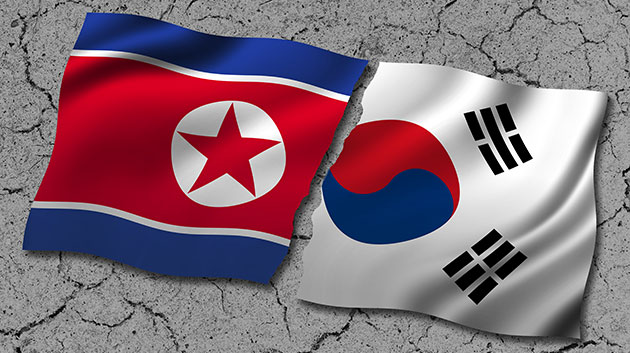South Korea’s Political Turmoil Is Reminiscent of the Eve of Japanese-Sino War
Japan Needs to Discuss the Emergencies on the Korean Peninsula
Main points of this article:
- The turmoil on the Korean Peninsula looks much like the eve of Japanese-Sino War.
- The Yi (Joseun) Dynasty of Korea is beset with troubles both at home and abroad
- Japan needs to strengthen the country’s defense in preparation for emergencies on the Korean Peninsula
In South Korea, President Park Geun-hye Was Ousted via Impeachment, While North
Korea has been repeatedly launched missiles. In May, the South Korean presidential election is scheduled to be held, and it is expected that a candidate who takes a softer stance on North Korea could become a next leader of the country.
Watching TV or Internet news, few people may be surprised at the chaotic political situation on the Korean Peninsula.
The Korean Peninsula is very close to Japan. The distance between Japan and Busan, the second largest city in South Korea, is just 214 kilometers. In the Korean War that started in 1950, the North Korean forces once surrounded Busan. So Japan cannot ignore the turmoil in the Korean Peninsula as something unrelated to its own security.
A former senior official of the Self Defense Forces says that the current chaotic situation on the Korean Peninsula resembles the eve of Japanese-Sino War.
This article will discuss the relationship between Japan and the Korean Peninsula from a historic perspective.
The Political Turmoil on the Korean Peninsula Triggered the First Japanese-Sino War
The First Japanese-Sino War was fought between the Qing dynasty of China and Japan, but what actually triggered the war was the political turmoil on the Korean Peninsula.
At that time, the Yi Dynasty of Korea ruled the peninsula, but the country was a de facto subject state of the Qing Dynasty of China. There were fierce struggles for power within the Korean administration and the domestic confusion made it difficult for the government to make political decisions.
Heungseon Daewangun, who was the father and regent of the king of Korea and governed the country, detested foreign powers and firmly maintained the policy of national isolationism. Empress Myeongseong (unofficially known as Queen Min) who promoted an open-door policy with the help of the Japanese government, confronted Daewangun.
The ranks of the army units were divided into the two factions. When Queen Min increased in power, the salaries of the conservative soldiers were held back for more than a year. The confrontation between the conservatives and the group advocating the opening of the country threw the country into the state of confusion. When the disgruntled soldiers started rioting, the Daewangun, the head of the Conservative Party, took advantage of the revolt to attack the Japanese Legation and the palace of Queen Min, taking over the administration again. (The Imo Incident in 1882)
The Administration Stopped Functioning and the Korean Peninsula Was at Mercy of the Foreign Powers
When Qing’s troops intervened in Korea on the pretense of quelling the disorder, they seized Daewangun and confined him in China for three years. Shocked by the incident, Queen Min gave up opening the country and changed the policy from open-door to pro-Qing.
After that, Kim OK-gyun, one of the members of the Enlightenment Party, staged a coup with the support of Japan, and established a new government. Several days later, however, Queen Min with the Qing’s backup suppressed the revolt.
Kim OK-gyun, who wished for the independence of Korea, was killed in Shanghai by the assassin sent by Queen Min. Kim’s body was dismembered and parts of his body were put on public display.
In the midst of the chaos, the aggravated peasants and followers of the Donghak religion that aimed to overthrow the Yi Dynasty and expel the foreign forces rose in revolt throughout Korea in 1894. (The Donghak Peasant Revolution) The Qing dispatched its troops to Korea on the pretext of suppression of the riot, which immediately triggered the Japanese-Sino War.
In Korea before the Japanese-Sino War, the administration stopped functioning and was at mercy of foreign powers. This resembles the current situation of South Korea that is also facing calamities within and without; the dysfunctional government is due not only to the presidential impeachment, but also to North Korea’s missile launches, and economic sanctions by China that wants to ban imports of Korean products.
The Japanese at That Time Took Action with a Sense of Crisis
Meanwhile, the Japan of those days harbored a considerable sense of crisis that if Russia had colonized the Korean Peninsula, its next target would have been Japan, so they hurriedly modernized the nation through the Meiji Restoration. At the same time, they strongly wished that the Yi dynasty would become a strong, independent modern state.
In 1876, Japan signed the Japan-Korea Treaty of Amity, which was Korea’s first international pact. The Article 1 stated that Korea was a free nation, “an independent state enjoying the same sovereign rights as does Japan.” Other European countries took the opportunity to conclude pacts with Korea as well. (Refer to “Japan, A Country That Emerged on the Center Stage of World History” by Shoichi Watanabe) In other words, Japan was first in recognizing the Yi Dynasty as an independent state, ahead of any other countries.
Japan of those times tried hard to make the country prosperous and strengthened the country’s defense by implementing the policies of increasing wealth and military power and encouraging new industry, while at the same time it wanted the Yi Dynasty to make the country strong. Japan committed itself to East Asia and took various actions to prevent major powers like China and Russia from exploiting the Korean Peninsula.
The Diet in Japan is now wasting time, money, and human powers by pursuing the Moritomo Gakuen issue. However, the top priory for Japanese politicians is to prepare for emergencies on the Korean Peninsula, and in order to do so, they must swiftly consider measures like improving legislation, strengthening the nation’s defense, and possessing nuclear arms. It is necessary for Japan to have “strength” and a “strong will” to bring stability not only to the country but also to the whole Asia.




















